| dc.description.abstract | This thesis uses panel data for 217 countries between 1960 and 2007 to examine how relative factor endowments of countries affect whether democratization is an option when a non democratic country starts opening up to globalization. The analysis is based on the theory by Acemoglu and Robinson (2006), and uses a wide specter of econometric methods to see if the data points in the same direction as the model. In accordance with the model, the countries in the data set are divided into two groups: one group containing labor abundant countries, and the other groups containing capital and land abundant countries. The statistical results indicate that globalization is positively associated with democratization among labor abundant countries, but that globalization is negatively associated with democratization in capital and land abundant countries. The result are robust, and thus this thesis concludes that the evidence in support of Acemoglu and Robinsons (2006) argument is present. | nb_NO |
